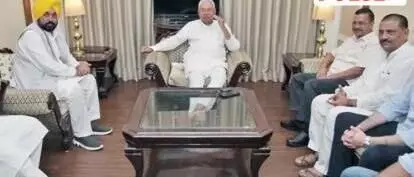
AAP takes jab at another Oppn unity code in giving ‘in principle’ support to UCC
text_fieldsNew Delhi: In the midst of an Opposition unity gathering, AAP took a stand in Patna regarding a Central ordinance, which did not go over well with the other attendees. However, it's possible that the Aam Aadmi Party (AAP) has widened the gap between itself and the groups attempting to unite in opposition to the BJP.
The AAP stated it supports the controversial move "in principle" a day after Prime Minister Narendra Modi lent his backing to the rumours that a Uniform Civil Code (UCC) might be the next item on his government's legislative agenda.
Although the AAP has already stated that it supports a UCC, the timing has alarmed the opposition, which stressed in Patna the importance of speaking with one voice on matters, Indian Express reported.
AAP National General Secretary Sandeep Pathak responded to PM Modi's remarks to party members in which he said that a nation could not function with various laws for different people, “We support Uniform Civil Code in principle. Article 44 also says there should be UCC in the country.”
Pathak, however, added the rider that there should be “wider consultation with all religious leaders, political parties, and organisations, and a consensus should be built”. “Some decisions cannot be reversed, some matters are fundamental to the nation. Authoritarian decisions cannot be taken on such matters,” he said.
This was standard AAP double-speak to Congress leaders. The AAP, which has expanded in Delhi and Punjab at the expense of the Congress, is not welcome in either state, according to the party's state sections. “The AAP has been saying that it is keen on tying up before the 2024 polls. Arvind Kejriwal has met almost all key Opposition leaders. But UCC is a very controversial issue and all parties have differing views on it. At a time when the schedule for the second meeting of Opposition parties after Patna is being finalised, it was very surprising to see such a statement from the AAP,” said a senior Delhi Congress leader.
At the Patna conference, Kejriwal asked Congress to support his administration in opposition to a Centre-passed ordinance. Congress remained steadfast in its position that a decision would be made following "internal discussions." Other opposition parties warned AAP not to let a single issue undermine efforts to unite them.
After that, Kejriwal and other AAP leaders departed without addressing the joint press conference by the parties. Back in Delhi, the AAP asserted Kejriwal had asked Rahul Gandhi for a one-on-one meeting "with folded hands" but had been denied. The statement added that it would be "very difficult" for it to support any party that did not publicly condemn the ordinance, which strips the Delhi government of its authority, and that it had not yet decided whether or not to attend the next Opposition unity meeting.
Another senior member of Congress claimed that the AAP was merely making a show of itself and had no intention of adhering to the fundamentals of Opposition unity. The speaker used the AAP's prior vehement support of the Modi government's repeal of Article 370 in Jammu and Kashmir as an example.
“There is a reason the Congress is wary of tying up with the AAP. There was no real need for it to make a statement like this at this time, but when you do, it leaves us in doubt as to whose team you are on. Everyone knows that you turned your back on Kashmir when its rights were taken away, but you want unconditional support from other parties,” the Congress leader said.
AAP leaders argue, in turn, that its stand on UCC is well-known. “The goal is to ultimately have a common code for everyone. That is also what the Constitution envisioned. But our leader also said that a UCC cannot be passed without consultation, or through force,” a party insider said.
The AAP also cites its designation as a "post-ideological party" as support for its position. The basic tenet of the AAP, according to party leader Kejriwal, is work.
According to a top official, if there is one principle that the AAP stands by, it is supporting issues of national security, sovereignty and the Constitution. “On these issues, we are clear. The nation comes first,” the leader argued.
Prashant Bhushan, a founding member of the AAP, had previously expressed support for a referendum in Kashmir, but the party had rejected his statements, which led to Bhushan's eventual departure from the organisation.
This ideological mobility may only be effective up to a certain degree, according to a different former AAP leader who left the party a few years ago. “When you do not have an ideology, stands can be changed. The AAP has done well to promote the work it has done in the city, but there are some issues that require you to take a moral stand,” said the leader.
As to where this leaves the AAP ahead of the second meeting on Opposition unity, expected in Bengaluru in mid-July, a senior AAP leader said: “I don’t think this will affect anything. The issue of a UCC is an important one, and we have made it clear that its implementation should not be pushed through. As for attending the second meeting, we will take a call soon.”























